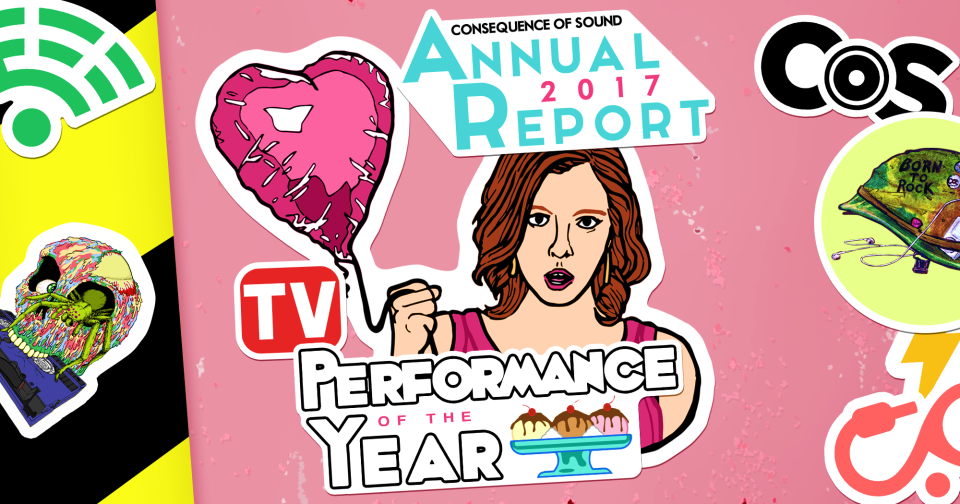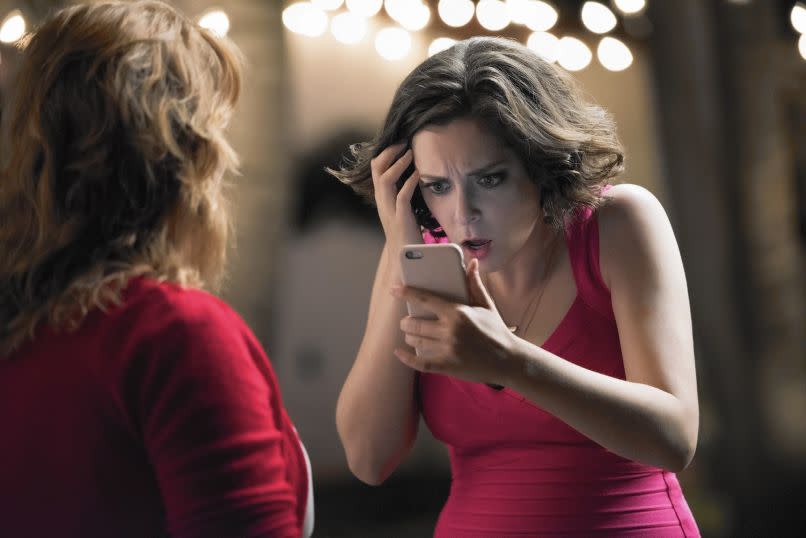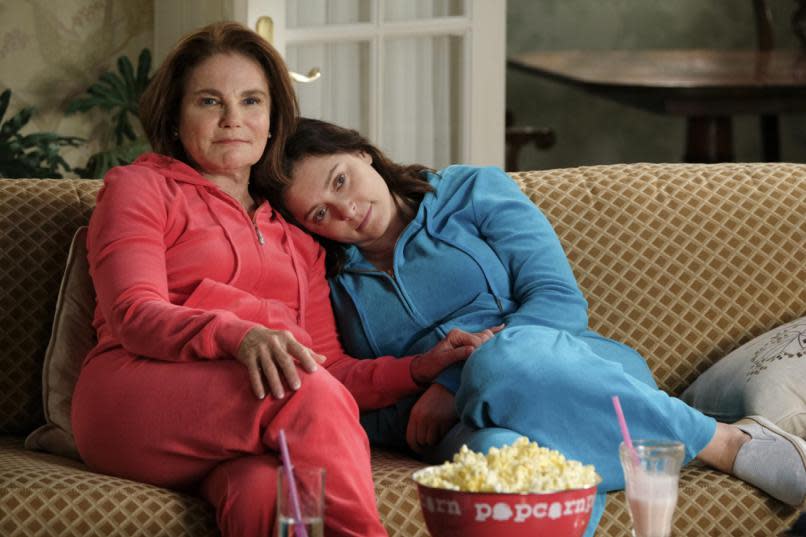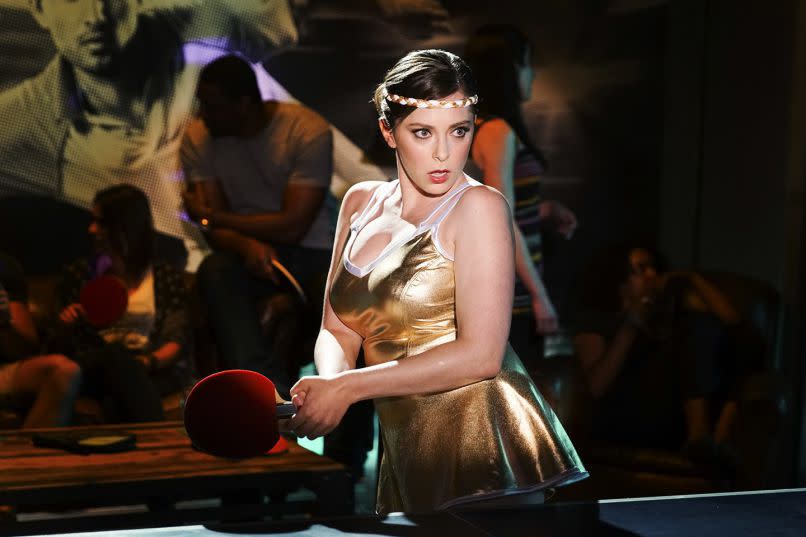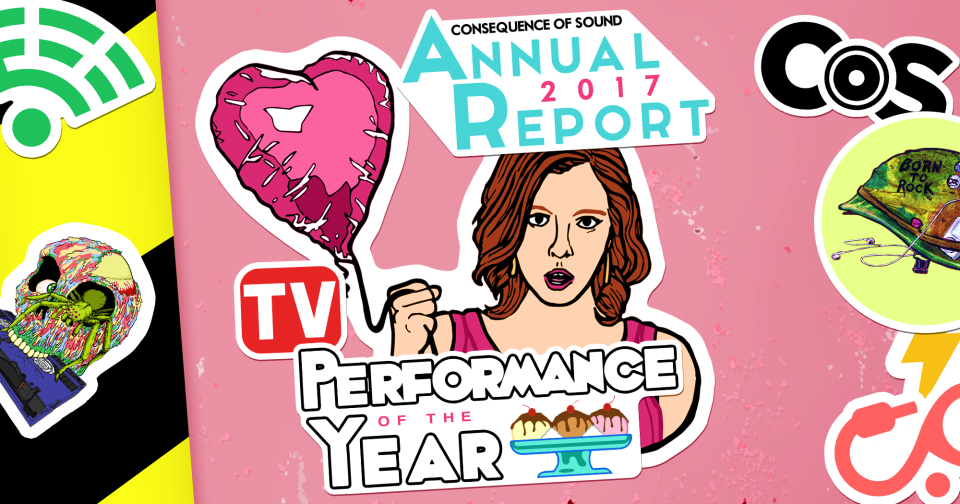Crazy Ex-Girlfriend’s Rachel Bloom on Being the Most Talented Person on TV Right Now
“That’s horrifying. We live in the apocalypse. It’s fine.”
Rachel Bloom’s driving down the freeway, headed to watch the finale of season three of Crazy Ex-Girlfriend, and then another wildfire breaks out. It’s been a difficult day, as she’s also dealing with some car trouble — “I thought I was being a hero, driving an electric car” — but there’s light at the end of the tunnel, and it’s not another fire. For once, she gets to take it just a little easy at the office: “I’ll just get to sit back for an hour, not talk, and watch Aline work.”
Aline is Aline Brosh-McKenna, the showrunner on Crazy Ex-Girlfriend and the woman with whom Bloom co-created The CW’s underseen but well-loved critical darling. It’s rare that Bloom gets a chance to wear just one hat, and truth be told, that won’t happen at this screening either. Still, there’s a sense of relief and accomplishment in her voice, an obvious pleasure in knowing that she can take a load off for just a couple minutes.
Trying to pinpoint one thing as being the most impressive element of Bloom’s performance as Rebecca Bunch, the complicated protagonist of Crazy Ex-Girlfriend, is a fool’s errand. Is it the singing? It might be the singing, because damn, this woman can sing. Is it the ruthless precision with which she handles every punchline? Very possibly. Is it the fact that, despite having demonstrated her willingness to go to some dark, vulnerable places as an actor in both of the show’s previous seasons, she somehow went to a darker and much more vulnerable place this year? That seems about right.
Yet the easiest answer is probably, actually, a question: how the fuck is she this good when she’s doing so many other things at once?

The answer to that seems to be that, in a way, it helps. Watching this finale, she won’t be scrutinizing her own performance, examining every emotional beat or worrying about whether or not she did a weird thing with her face in one scene or another. She’s got other things going on.
“I think that if all I did in the show was act, watching myself would be way more stressful, but because I have to worry about so many other things… I’ll sometimes be sitting with Kabir [Akhtar], who is our head editor and won an Emmy for editing the show. And I’ll be like, “Do we have a take of me saying it this way?” And he’ll say, “No, the actress did not do that.” And it’s sometimes fun to, instead of saying me, say ‘she.’ Like, “Do we have a take where she—.” It’s almost like I put on my producer hat, and then it’s not me.”
That’s probably a healthy distance to have from time to time. As a co-creator, Executive Producer, writer, songwriter, and the force behind all the internal music videos, Bloom puts a great deal of herself into the show before she ever hits the set. The result is a series that’s personal, funny, and crackles with intelligence, and which is never satisfied to go after the simple solution when a complicated one would be so much more fun. It’s a philosophy laid plain in the first of the show’s three theme songs to date: “The situation’s a lot more nuanced than that!,” she yells at an overzealous cartoon sun. Crazy Ex-Girlfriend has been proving it ever since.
A lot of that proof comes in the form of Bloom’s honest, funny, and occasionally uncomfortable performance. It’s a turn that’s wholly grounded in emotional truth even when when the series strays far, as it so often does, from realism, and one that’s allowed Rebecca Bunch to remain a character about whom the audience cares deeply, even as she does questionable, dangerous, and cruel things. No matter how dark it gets, there’s a sense of wit and warmth that pervades the show, and much of that is due to Bloom’s work.
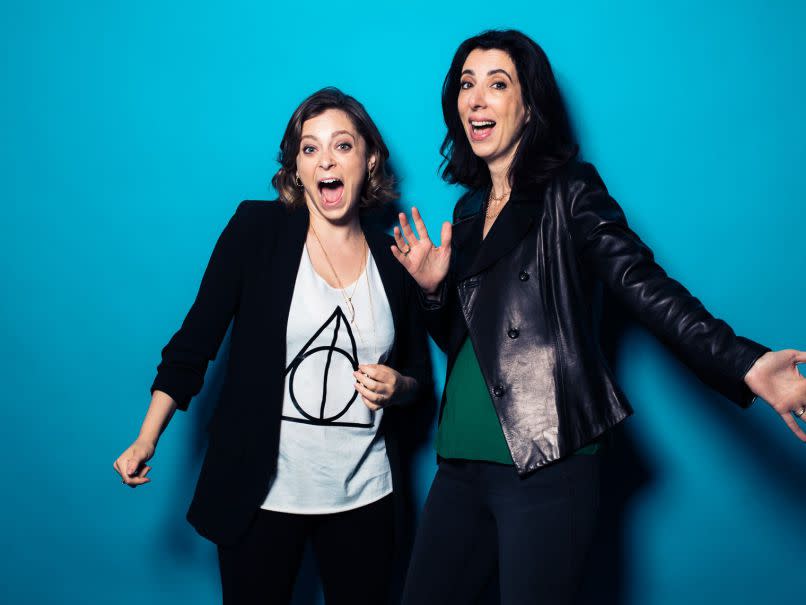
We asked Brosh-McKenna what makes this performance such a special one, and she echoed those sentiments:
“Two things: intelligence and joy. Rachel’s essential brilliance always shines through in how she plays Rebecca. It greatly helps the show in that no matter how much you worry about Rebecca, you always believe she has the smarts to find her way through. There aren’t a ton of people who can credibly play someone with that high-powered an intellect.
“And joy, because Rachel radiates warmth and happiness like a small sun. It’s one of my favorite things about her as a person and as an actress. Rachel truly loves to perform, it’s such a critical part of her being, and that love infuses Rebecca with hope and optimism in a story that is sometimes bleak.”
That bleakness, more pervasive in the third season of Crazy Ex-Girlfriend than in any other to date, hasn’t stopped it from being one of the most consistently entertaining, inventive and deeply compassionate shows on television. What follows is the rest of our exclusive interview with Bloom, whose performance dwells in both that bleakness and the light. In the darkness and the sunshine, you’ll find her, acting her ass off — sometimes noisily, sometimes quietly, and sometimes in a Bob Fosse-style number that contains the lyric “Let me choke on your cocksuredness.”
Whatever the mode, it’s a hell of an accomplishment, and it’s why Consequence of Sound has named hers the Television Performance of the Year.
Warning: This interview contains spoilers from the most recent season of the show.
__________________________________________________________
On losing the writer/producer hat while acting
It’s really hard, and I’ve got to say, I don’t really. But at a certain point, if it’s a very emotional scene, I just have to forget about all of that stuff.
[At] different points in the season, I have a different experience. So for the first five or six episodes [of each season], I was in the room for breaking those stories, I was much more active. But when you start getting into the middle of the season, those are episodes that have been broken without me in the room. It’s much more news to me, when I’m reading the outlines of the scripts, [and] I have way less of a command of what the origins of the story were.
It’s never conventional, but it’s much more like an acting gig, where I’m going off of what was on the page as opposed to my own preconceptions.
__________________________________________________________
On doing all those jobs at once
I script all the music videos out, I supervise the edit of all the music videos, I give notes on the edit… [and] that’s the most stressful part. My own performance is almost — it’s cool, it’s cool to see it. It’s mostly positive, actually, because I’ve been playing the character for so long now, I have a pretty good control over what I want the scenes to be like. There aren’t a lot of times where I’m like, “oh… I fucked that up.”
The stressful part is when I’m looking at things in the edit and [saying] “I need to sit with the editor, and that music video needs to be completely redone.”
We try to write as many songs before I go into production as possible. Nine times out of 10, I’ve had a hand in writing the song, whether I was the main writer on the song or I co-wrote the song, but even when I don’t, because I script them, I’m always watching.
__________________________________________________________
On “A Diagnosis” and the music in general
“A Diagnosis” was scary… The day we shot it, it was one of the harder days for me, because it wasn’t trying on a narrative, trying on a genre. It was much more an emotional outburst.
You know, there’s a way to have done that song that’s much more a comment on the genre, and early on, we decided… this is a moment of earnest emotional expression. And that’s always scary for me. There’s no parody to hide behind. Musical theater can be cheesy, [but] luckily I work with three other people who aren’t a quarter as big of fans of musical theater as I am, so we have a pretty good cheese-o-meter… Even when we have silly songs, there’s a deep emotion beneath them, [and] it relates to Rebecca’s emotional experience and life story. Like “I Love My Daughter”… it was Rebecca asking Darryl, “what are you talking about, this bond between fathers and daughters? I don’t understand what that is.”
The more purely true the song, [the] scarier and more vulnerable and risker it is for me. Which is cool, but definitely way scarier than something like “Strip Away My Conscience”, which is this person embodying a trope, the song itself commenting on the trope. Whereas “A Diagnosis”, which I see as a kind of fraternal twin sister of “West Covina” [from the pilot] — it’s an earnest emotional outburst. It’s still done within a musical theater structure that Rebecca knows and recognizes, but it’s not trying to comment on it. It’s the closest thing we have to an earnest “I want” song.
Usually when we do the blocking rehearsal I’m fine rehearsing in front of the crew, I don’t need a private rehearsal with the musical numbers, especially if we’ve had choreography. I know it, I’m fine. This one, I needed to be with the director, and have private rehearsals, and figure it out, because it needed to feel like it came from a grounded, organic place.
I mean, the other hard part is that episode six is usually the point in the season where we start to get fucked — I mean, really, really fucked — on budget. If you watch the series, you can tell kind of around [episodes] six and seven, there’s a bit of a dip. “Friendtopia” last year, we were fucked on budget, so that’s why the musical number for the most part takes place in Home Base. I’s a lot cheaper to shoot on our standing sets, and we just put on a filter and we change the lighting, done.
With “A Diagnosis,” we were dealing with these small hallways, we couldn’t build [a big set]. You know, there’s a world in which that song was an almost “hills are alive with the sound of music” moment. But the hallways were so short, so the pressure was on me to just sell the internal bubbliness of it. The internal specialness. You couldn’t film this sweeping number, and that alone was its own interesting challenge. I love the way it came out, it came out very internal and genuine, and I think I’m actually glad we had that restriction.
There’s a scariness to when we have songs that are more emotional, and dramatic, and genuine. I’ve learned that that’s when it’s really exciting and good. There’s a song in the finale along those lines… There’s definitely a different feeling.
__________________________________________________________
On balancing sharp humor with vulnerability
For me, at the end of the day, my guideline is, “does it feel real?” That’s why sometimes in the writers’ room, I’ll have a note like, “this line is too written, this joke is too written, there’s no way I can do this that won’t make it seem like Rebecca had a writer’s room behind her.”
But I think [the key is] just grounding it all emotionally. Like that line, “These are the moments when I used to laugh, so…,” the emotion behind that line is deep fear, and doubt, and a little bit of depression. As long as I understand emotionally where she’s coming from, that’s how I ground the joke. With the songs, [there’s] a nice excuse, because she’s inhabiting a character. And so those songs can be overblown and very dramatic, because that’s what she’s imagining.
I think it just depends on feel. It always has to just feel like something [Rebecca] would say. It’s why I love improv. What we’ll do on set is get the scene as written, and then we’ll do a fun run. I like doing those fun runs, because they hook me into the scene emotionally. I have to be present, and I have to be listening and reacting the way the character would. Even if I don’t have some funny new line to improvise or whatever, I’ll find that my reactions are genuine, because I thought, “OK, forget the script, forget what I thought the scene should be. What would I actually do in the moment?” And so I come from a very, for lack of a better term, holistic, organic place when playing this character.
__________________________________________________________
On Rebecca’s suicide attempt and mental illness
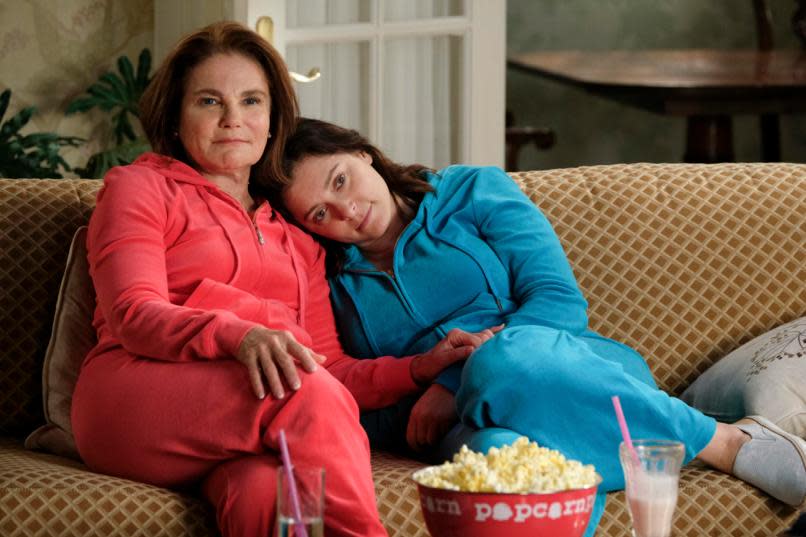
We have known that [was coming] since January or February, when we started brainstorming the season. Once we decided it was pills, and that it was on a plane — being on a plane even when you’re not suicidally depressed is so miserable — the idea was, “we have to do this realistically, we can’t do the dramatic [thing where you] take a swig of pills.” When you’re overdosing on pills, every pill is a decision.
We went into outlining the episode with that in mind, and Jack Dolgen, who’s one of my best friends and who wrote the episode, and who — he’s tweeted about this — he’s had personal experience with suicidal thoughts and ideation his whole life. I have not, I’ve struggled with anxiety and depression and O.C.D., but I’ve never had that. So his first draft of the script really got into, not only Rebecca’s head, but the psyche of [what it’s like] when you just want to end it, and when you want the pain to stop.
I mean, the way that he wrote that scene did a lot of my acting prep for me, because he walked me through, literally moment-to-moment, that thought process. It was very affecting to read. Something [Aline Brosh-McKenna] told me is that people who try to end their lives, they don’t want to die. They just want the pain to stop, which is a line that we put in. That became my motivation — I don’t want to die, I just want to stop feeling this way. It was something I’d never really thought of before, as an action. And so having to embody that, to experience one twentieth of what that emotion is [compared to] someone who is about to end their life — it was really hard.
I mean, there are certain unpleasant scenes in the show that I find very cathartic. Like the scene in episode four where she’s yelling at her friends. I, as a person, hold in anger, because I have this thing inside me that says “I want everyone to like me.” So there’s a lot of anger that I’ve bottled up, there are a lot of revenge fantasies that I’ve never acted out. In some ways, the character is somewhat this [piece of] fucked-up wish fulfillment, so those scenes aren’t hard emotionally. Scenes like this are hard. When it’s like an emotion that is kind of foreign to me, that I really have to embody to get right, I wanted to do it as few times as possible, because it was so unpleasant.
And I have to say, I’m not a crier. That scene, midway through, I burst into tears. And in general, this season has caused me in my life to cry more. Crying, getting to that place [as an actor], became easier in scenes. Also just as a person, I feel that well opening up a little more.
__________________________________________________________
On collaboration and cutting aliens out of songs
When I talked about songs being scary, right? [“You Stupid Bitch”] was really scary.
I wrote it so based on feeling. [Originally] I had a bridge that was a little lighter and more comedic, something like “I wish I could go to a planet” — it was something about aliens, because that’s what I do.
[But] I couldn’t put my finger on what — in my head, it was Bernadette Peters at Carnegie Hall. So I had a melody in my head that I knew wasn’t quite right, I couldn’t articulate it, and I sang it at the table read, and it didn’t get a ton of laughs. The only part that got laughs was that bridge. But I remember Donna Lynne [Champlin, who plays Paula] saying to me, “Hey, can I tell you something? I don’t think you need that bridge, I think you’ve earned the song without that lighter bridge, and I think you should be proud of it.”
Then simultaneously, I sent the song to Adam Schlesinger, and I [said] “here’s this song, I know something’s off,” and he said, “oh, I completely understand where you’re going with this melody that you had. I have a better idea, can I do that?” And I said, “100%.” And he completely reworked the music end of what I’d had, to make it this real torch song in a way that I couldn’t articulate.
It was a song where I needed to have other people say “I understand what you’re saying,” because there was a part of me that thought, “this is just gonna come off as dark and fucking insane, and it didn’t. And it’s great to continue to hear that people identify with it. Because honestly, that validates me! I have, a little bit with this show — and I don’t know if Aline feels this way — but I feel like, in doing this show, in sharing some of these scary, vulnerable parts of myself, it feels like spitting out the poison. And it’s not just mine anymore, it’s not just my secrets, and my feelings. I’m giving it to everyone, and it makes it hurt less.
__________________________________________________________
On what’s next
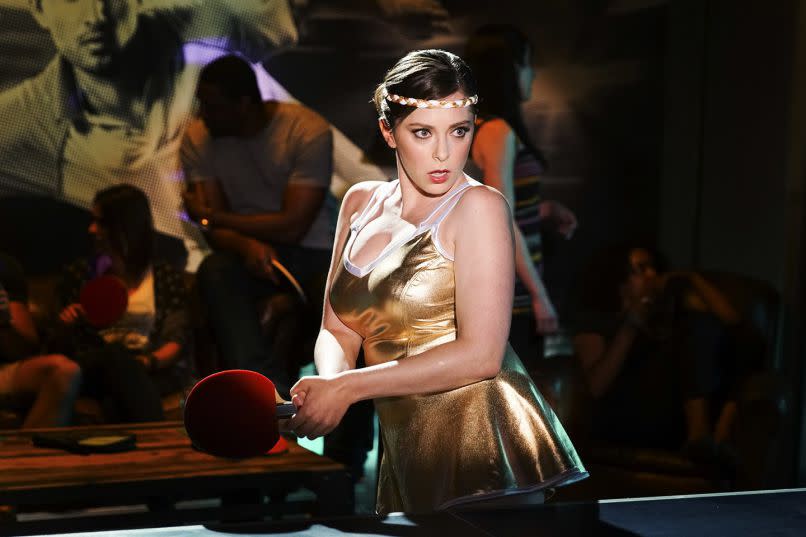
We have our 100th song, which comes in the ninth episode. It just happened to be our 100th song, but feels very much like a song that we couldn’t have done in the first two and a half seasons. Aimee Hill, who plays Lourdes [Josh’s mother], has a song coming up that I just love. And I really like the second part of the season, because it starts to take the things we’ve done with mental health and marry them with the themes of love and obsession that took up the first two seasons, so that’s very exciting to me.

